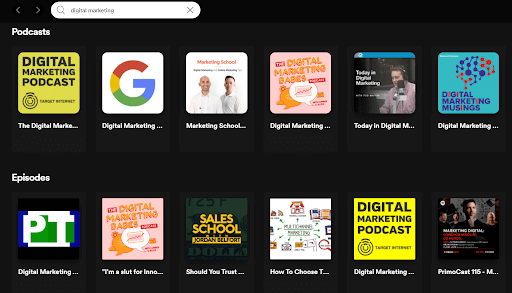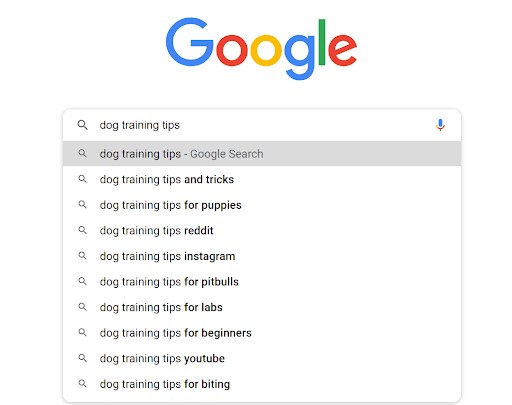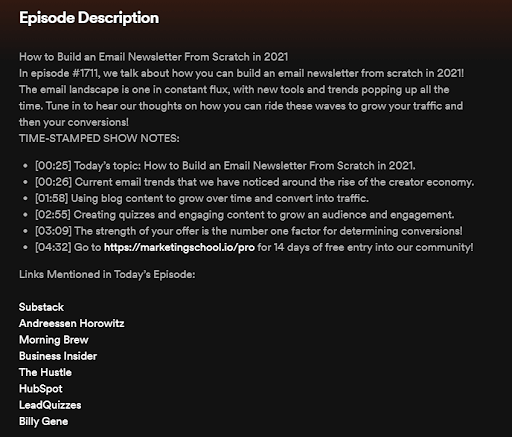SEO is the process of tailoring your website’s pages for a specific keyword. By doing this, you increase the likelihood of your page(s) being found by people searching on search engines. But how does this apply to your podcast?

In this guide, we’ll go over how implementing podcast SEO can help promote your podcast on search engines and increase your viewers and subscribers.
Why is SEO important to your podcast?
When it comes to promoting your podcast, people typically think of social media marketing. However, that is just one form of promoting content. Podcast SEO is another effective solution that can work alongside your social media campaign.
This works because SEO has become more applicable to various content like videos, images, and now even your podcast. Here are two reasons why many businesses and podcast producers are starting to invest in Podcast SEO.
Google now shows podcast episodes on search results.
One big reason for the rising trend of podcast SEO is the update where Google is now allowing podcast episodes to be found on its search results. This opens up a new door for many podcasts to increase their viewers by utilizing this opportunity to increase their organic search traffic.
In addition to this change, Google may automatically transcribe your podcast (note: it is still new and not perfect), and based on your episode’s content, it can be found on relevant keyword searches. Because of these two things, many podcast producers have begun changing how they create their podcast episodes and start implementing podcast SEO.
Audio streaming and media services providers have a search function.
The second reason for the emphasis on podcast SEO is that audio streaming and media services also have search functions Like Google and Yahoo; software like Spotify and iTunes also acts as a search engine when people search for something in their database.
When people want to know more about digital marketing, Spotify (or wherever you find your podcast) will display different podcasts or even specific episodes that match or are relevant to the keyword query. For example, searching the keyword “digital marketing” on Spotify would bring up these results.

By being easily accessible on any podcast platform, it increases the number of viewers and subscribers. Knowing this potential of being found amongst “2 million other shows” and “48 million episodes” [Podcast Insights, 2021], it’s now more important to focus on search engine optimization. But, there are also benefits in investing in podcast SEO to increase your presence on platforms like iTunes and Spotify.
Get FREE Digital Marketing Courses and Tutorials Here!
How do you do podcast SEO?
Now that you know the importance of SEO in your podcast, it’s time to learn how to implement its strategies. Here are the steps to optimizing your podcast:
#1. Keyword research
Similar to how you start your on-page SEO, podcast SEO starts with keyword research. This is an important step because, without proper keyword research, you may not be targeting the best keyword that will lead you to the most clicks.
For example, if you will do an episode series about dog training tips, you shouldn’t simply talk about dog training tips broadly. You should be more specific and include a targeted keyword or keyword phrase that is easier to rank.
By doing this, it helps the audience know more about your episode before even clicking on it. But more importantly, it provides more context for search engines to connect your content with a specific keyword. This results in a higher chance of ranking higher on search results and more likely to be clicked.
But, how do you find the right keywords?
One of the simplest ways to do keyword research is to use Google and its suggested keywords. Using the same idea of dog training tips, you can search “dog training tips” on Google, giving these suggestions.

Using this simple trick, you can find what keywords are being frequently searched. In addition, this provides more specific topics to talk about. You can focus on dog training tips for specific dogs or for certain topics like biting. Overall, starting with keyword research can help you find the best keyword to rank for and get your podcast results.
#2. Optimize your title
Now that you have your keywords that you want to target, it’s time to implement them into your podcast. The first place to start is your title. Staying on the same example, you wouldn’t title your podcast series on dog tips “Dog Training Tips Episode 1.”
Using the keywords you found in your keyword research, you should now title your episodes with that keyword, so you are not targeting broadly. Depending on your topics, you can have titles:
- Episode 1: Dog Training Tips For Labs
- Dog Training Tips For Biting With [Guest Speaker]
- 10 Best Dog Training Tips For Puppies
Note: You can make your title more unique or interesting, but the main point of this section is to have your targeted keyword in your title.
#3. Add a detailed description.
The next step is to use podcast SEO in your description(s). Although your title gives information on the topic of your podcast, providing a detailed description can provide more information to visitors and, more importantly, search engines.
You can include your main keyword and even relevant keywords like LSI and keyword variations that help search engines better understand what your content is about. This, in turn, helps boost your SEO and increase the change of your podcast or podcast episode to rank in certain keyword queries.
Here is an example of a description by Marketing School – Digital Marketing and Online Marketing Tips in their episode called “How to Build an Email Newsletter From Scratch in 2021 #1711.”

In the podcast example, they have the main keyword of “how to build an email newsletter” and things that are relevant to the keyword like “email landscape.” This may seem small, but these small additions can help your podcast SEO efforts.
#4. Transcribe your episodes
The fourth step you can take is to transcribe your episodes. This is very beneficial if you include your podcast on your website. By transcribing your podcast, you can include more information to follow along while listening to your episode. But, in addition, you also include more relevant information for search engines.
With more relevant information, you increase your SEO score and, as a result, have a higher chance of ranking for your targeted keyword but also ranking for related keywords.
#5. Provide additional information on each of your episode
Like your detailed description, you can also add additional information about your episode that helps with the user experience, but it also helps with your podcast SEO campaign. In your description, you can include show notes and other information.

In the same example by Marketing School – Digital Marketing and Online Marketing Tips, they include timestamps for specific topics. This helps go over the different sections of the episode, but this also provides the opportunity to include highly relevant keywords.
If you publish your podcast on your website, you have more freedom to add more content that helps both with UX and with SEO. Here is some additional information that you can provide:
- Key takeaways
- Show notes
- Guest information
- Resources/links
- Promotionals for other content
#6. Don’t forget to add your keywords in small places.
The last step you should take to optimize your podcast for podcast SEO is to include your targeted keywords in small places. One example is in your image(s). This especially applies if you have a lot of images on your website for your podcast episodes. You can include keywords in your image file name and your alt tags.
The next place you can include your targeted keyword(s) is your URL (assuming you have your podcast on your website). This provides a boost to your SEO when search engines like Google crawl through your website. Here is one example by Search Engine Journal’s podcast episode titled: Importance of Understanding Your Audience [Podcast]

Although these may be small additions and tedious, their impact plays a role in your over SEO strategy for both on-page SEO and podcast SEO.
How does this impact your social media campaign?
SEO is another means of promoting content. However, both SEO and social media support each other. This is because keywords also matter in social media. Things like searching, hashtags, and things like LinkedIn’s algorithm are things that SEO can help with by niching down your content, making it more relevant to specific topics.
Conclusion
Podcast SEO is another good way to promote your podcast. By following each step from starting with keyword research and then applying the keyword you found to your content, you can help increase your SEO for your podcast pages. In conclusion, we hope that these tips can help you grow your podcast.






